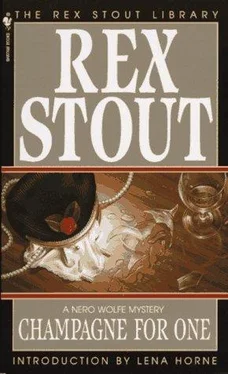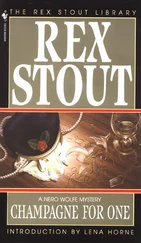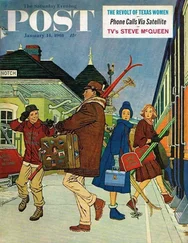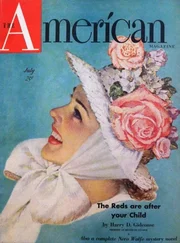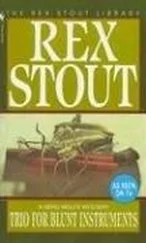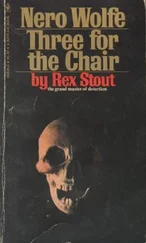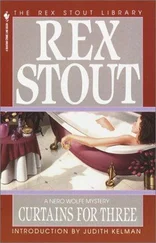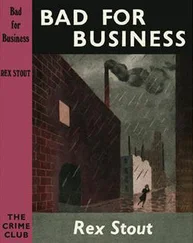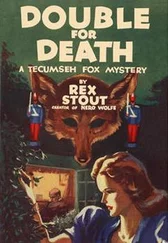Rex Stout - Champagne for One
Здесь есть возможность читать онлайн «Rex Stout - Champagne for One» весь текст электронной книги совершенно бесплатно (целиком полную версию без сокращений). В некоторых случаях можно слушать аудио, скачать через торрент в формате fb2 и присутствует краткое содержание. Жанр: Старинная литература, en-GB. Описание произведения, (предисловие) а так же отзывы посетителей доступны на портале библиотеки ЛибКат.
- Название:Champagne for One
- Автор:
- Жанр:
- Год:неизвестен
- ISBN:нет данных
- Рейтинг книги:3 / 5. Голосов: 1
-
Избранное:Добавить в избранное
- Отзывы:
-
Ваша оценка:
- 60
- 1
- 2
- 3
- 4
- 5
Champagne for One: краткое содержание, описание и аннотация
Предлагаем к чтению аннотацию, описание, краткое содержание или предисловие (зависит от того, что написал сам автор книги «Champagne for One»). Если вы не нашли необходимую информацию о книге — напишите в комментариях, мы постараемся отыскать её.
Champagne for One — читать онлайн бесплатно полную книгу (весь текст) целиком
Ниже представлен текст книги, разбитый по страницам. Система сохранения места последней прочитанной страницы, позволяет с удобством читать онлайн бесплатно книгу «Champagne for One», без необходимости каждый раз заново искать на чём Вы остановились. Поставьте закладку, и сможете в любой момент перейти на страницу, на которой закончили чтение.
Интервал:
Закладка:
Laidlaw didn’t hesitate. "I’ll sign it."
"With, as I said, no guarantee."
"As I said, I don’t expect any."
"Then that’s understood." Wolfe reached to pick up the cheque. "Archie. You may deposit this as a retainer and advance for expenses."
I got up and took it and dropped it in a drawer of my desk.
"I want to ask a question," Laidlaw said. He was looking at me. "Evidently you didn’t tell the police what happened when I asked Faith Usher to dance with me, and she refused. If you had told them they would certainly have asked me about it. Why didn’t you?"
I sat down. "That’s about the only thing I left out. For a reason. From the beginning they were on my neck about my thinking it was murder, and if I had told them about her refusing to dance with you they would have thought I was also trying to pick the murderer, and they already had certain feelings about me on account of former collisions. And if you denied it when they asked you about it, they might think I was playing hopscotch. I could always remember it and report it later, if developments called for it."
Wolfe was frowning. "You didn’t report this to me."
"No, sir. Why should I? You weren’t interested."
"I am now. But now, conveniently, her refusal is already explained." He turned to the client. "Did you know Miss Usher would be there before you went?"
"No," Laidlaw said. "If I had I wouldn’t have gone."
"Did she know you would be there?"
"I don’t know, but I doubt it. I think that goes for her too; if she had she wouldn’t have gone."
"Then it was a remarkable coincidence. In a world that operates largely at random, coincidences are to be expected, but any one of them must always be mistrusted. Had you attended any of those affairs previously? Those annual dinners?"
"No. It was on account of Faith Usher that I accepted the invitation. Not to see her-as I said, I wouldn’t have gone if I had known she would be there-just some feeling about what had happened. I suppose a psychiatrist would call it a feeling of guilt."
"Who invited you?"
"Mrs Robilotti."
"Were you a frequent guest at her house?"
"Not frequent, no, just occasional. I have known Cecil, her son, since prep school, but we have never been close. Her nephew, Austin Byne, was in my class at Harvard. What are you doing, investigating me?"
Wolfe didn’t reply. He glanced up at the wall clock: ten minutes past one. He took in a couple of bushels of air through his nose, and let it out through his mouth. He looked at the client, not with enthusiasm.
"This will take hours, Mr Laidlaw. Just to get started with you-what you know about those people-since I must proceed, tentatively, on the hypothesis that Mr Goodwin is right and Miss Usher was murdered, and you didn’t kill her, and therefore one of the others did. Eleven of them, if we include the butler-no, ten, since I shall arbitrarily eliminate Mr Goodwin. Confound it, an army! It’s time for lunch, and I invite you to join us, and then we’ll resume. Clams hashed with eggs, parsley, green peppers, chives, fresh mushrooms, and sherry. Mr Goodwin drinks milk. I drink beer. Would you prefer white wine?"
Laidlaw said yes, he would, and Wolfe got up and headed for the kitchen.
Chapter Six
At a quarter past five that afternoon, when Laidlaw left, I had thirty-two pages of shorthand, my private brand, in my book. Of course, Wolfe had gone up to the plant rooms at four o’clock so for the last hour and a quarter I had been the emcee. When Wolfe came down to the office at six I had typed four pages from my notes and was banging away on the fifth.
Most of it was a waste of time and paper, but there were items that might come in handy. To begin with, there was nothing whatever on the three unmarried mothers who were still alive. Laidlaw had never seen or heard of Helen Yarmis or Ethel Varr or Rose Tuttle before the party. Another blank was Hackett. All I had got on him was that he was a good butler, which I already knew, and that he had been there for years, since before Grantham had died.
Mrs Robilotti. Laidlaw didn’t care much for her. He didn’t put it that way, but it was obvious. He called her a vulgarian. Her first husband, Albert Grantham, had had genuine philanthropic impulses and knew what to do with them, but she was a phoney. She wasn’t actually continuing to support his philanthropies; they had been provided for in his will; she spent a lot of time on them, attending board meetings and so on, only to preserve her standing with her betters. "Betters," for Laidlaw, evidently didn’t mean people with more money, which I thought was a broad-minded attitude for a man with ten million of his own.
Robert Robilotti. Laidlaw cared for him even less, and said so. Mrs Albert Grantham, widow, had acquired him in Italy and brought him back with her luggage. That alone showed she was a vulgarian, but here, it seemed to me, things got confused, because Robilotti was not a vulgarian. He was polished, civilized, and well informed. In all this I’m merely quoting Laidlaw. Of course, he was also a parasite. When I asked if he looked elsewhere for the female refreshments that were in short supply at home, Laidlaw said there were rumours, but there were always rumours.
Celia Grantham. Here I had got a surprise-nothing startling, but enough to make me lift a brow. Laidlaw had asked her to marry him six months ago and she had refused. "I tell you that," he said, "so you will know that I can’t be very objective about her. Perhaps I was lucky. That was when I was getting a hold on myself after what had happened with Faith Usher, and perhaps I was just looking for help. Celia could help a man all right if she wanted to. She has character, but she hasn’t decided what to do with it. The reason she gave for refusing to marry me was that I didn’t dance well enough." It was while we were on Celia that I learned that Laidlaw had an old-fashioned streak. When I asked him what about her relations with men and got a vague answer, and made it more specific by asking if he thought she was a virgin, he said of course, since he had asked her to marry him. An old fogy at thirty-one.
Cecil Grantham. On him it struck me that Laidlaw was being diplomatic, and I thought I guessed why. Cecil was three years younger than Laidlaw, and I gathered that his interests and activities were along the same lines as Laidlaw’s had been three years ago before the event with Faith Usher had pushed his nose in-with qualifications, one being that whereas Laidlaw’s pile had been left to him with no strings attached, Cecil’s was in a trust controlled by his mother and he had to watch his budget. He had been heard to remark that he would like to do something to earn some money but couldn’t find any spare time for it. Each year he spent three summer months on a ranch in Montana.
Paul Schuster. He was a prodigy. He had worked his way through college and law school, and when he had graduated with high honours a clerkship had been offered him by a justice of the United States Supreme Court, but he had preferred to go to work for a Wall Street firm with five names at the top, and a dozen at the side, of its letterhead. Probably a hundred and twenty bucks a week. Even more probably, at fifty he would be raking in half a million a year. Laidlaw knew him only fairly well and could furnish no information about the nature and extent of his intimacies with either sex. The owner of one of the five names at the top of the letterhead, now venerable, had been Albert Grantham’s lawyer, and that was probably the connection that had got Schuster at Mrs Robilotti’s dinner table.
Читать дальшеИнтервал:
Закладка:
Похожие книги на «Champagne for One»
Представляем Вашему вниманию похожие книги на «Champagne for One» списком для выбора. Мы отобрали схожую по названию и смыслу литературу в надежде предоставить читателям больше вариантов отыскать новые, интересные, ещё непрочитанные произведения.
Обсуждение, отзывы о книге «Champagne for One» и просто собственные мнения читателей. Оставьте ваши комментарии, напишите, что Вы думаете о произведении, его смысле или главных героях. Укажите что конкретно понравилось, а что нет, и почему Вы так считаете.
